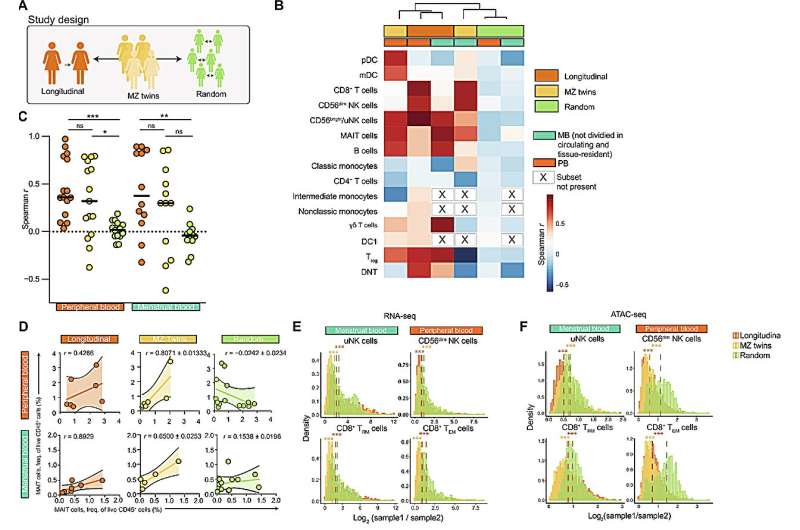This article has been reviewed according to Science X's editorial process and policies. Editors have highlighted the following attributes while ensuring the content's credibility:
fact-checked
peer-reviewed publication
trusted source
proofread
Study of twins provides new insights into immune defense in the womb

Niklas Björkström's research group at the Department of Medicine, Huddinge (MedH) has conducted a study that provides new knowledge about how the immune system in the uterus works. This knowledge contributes to a better understanding of how pregnancy complications such as pre-eclampsia occur.
The study, published in the journal Science Immunology, compared normal blood samples and menstrual blood samples from identical twins, showing that the immune system in the uterus is more variable compared to peripheral blood.
The results also show that the immune system in the uterus is less controlled by genetics and that the immune composition in the uterus is more affected by different environmental factors compared to the immune composition in the blood.
"For example, hormonal contraception is an environmental factor that has a major impact on the immune system in the uterus, while certain viral infections have a greater impact on the immune system in the blood," says Jonna Bister, who was the leading doctoral student in the study conducted by Björkström's research group at the Department of Medicine, Huddinge.
The study was conducted in collaboration with the Swedish Twin Registry. The twin pairs who wanted to participate had to provide a menstrual blood sample and a regular blood sample. These samples were analyzed using several different methods where the researchers looked at cell composition, the markers they express on the cell surface, and soluble proteins. The researchers also sorted selected immune cell populations to be further analyzed using advanced genetic and epigenetic methods.
By comparing identical twins and a control group of women who provided blood samples on several occasions over several years, conclusions could be drawn about the extent to which the immune system is controlled by genetics versus environment.
The immune system of the uterus is important for a healthy pregnancy and when the immunological interaction does not work, it can lead to pregnancy complications such as pre-eclampsia and repeated miscarriages.
The new study is the first large-scale study of the immune system in the tissue of identical twins and shows that the interaction between genetics and environment differs in tissue compared to blood. The results of the study provide new information on the composition and regulation of the immune system in the womb.
"The study shows the basis for how the immune system in the uterus is designed. In the long run, and with the help of further studies, the study contributes to a better understanding of how pregnancy complications such as pre-eclampsia arise," says Björkström.
The research group has several ongoing projects exploring the uterine immune system. Among other things, they are interested in how the immune system in the uterus changes during the menstrual cycle and whether pregnancy leaves an epigenetic imprint in the uterus.
More information: Jonna Bister et al, Tissue-specific nonheritable influences drive endometrial immune system variation, Science Immunology (2024). DOI: 10.1126/sciimmunol.adj7168


















